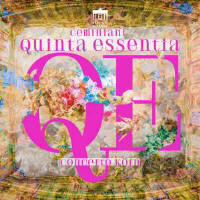Texte paru dans: / Appeared in: |
|
|
Reviewer: Bertil
van Boer
As one of the premiere
historical performance groups over the past several decades, the Concerto
Köln has been largely absent from the discography of late. I would guess
there are several reasons for this, such as the ongoing project to
reconstruct the historical practices of Richard Wagner, something that would
seem to take up monumental periods of time. This is not to say that the
group has given up on the music pre-1800, but over the past two years the
output on disc has been a bit limited. Last year there was a set of arias
meant for Farinelli with countertenor Valer Sabadus, along with a paean to
one of Vivaldi’s more proficient violinists at the Ospedale della Pietŕ,
Anna Maria, containing a couple of extra works by Baldassare Galuppi, his
successor there. A miscellaneous disc of works by J. S. Bach was also on
tap, and the year before (2017) there was a set of opera arias by Carl
Heinrich Graun. These are slim pickings, and given that during the first
decade of this century, the Concerto Köln was noted for its exploration of
offbeat and unusual repertory, this seems like treading musical water. To be
sure, the players a busy schedule with touring and opera performances; their
website notes the recent work with the Dutch Opera in Amsterdam on Handel’s
Rodelinda. Here they have appeared with their only release for 2019, a substantial sample of the concerti grossi of Francesco Geminiani. This composer, of course, needs no introduction, as his music has often been recorded before. He himself was no stranger to the international musical scene during his lifetime. As a contemporary of Handel, he was often his rival and even competed against him unsuccessfully as a composer of opera. He made his living as a teacher and was frequently published. During his later years he spent time in Paris, where he was lauded as the instrumental representative of the Italian style In 1755 he returned to England, and passed away in Dublin in 1762. His fame during the later part of the century rested largely upon a treatise on playing the violin, but he held sway over London audiences for his 42 concerti grossi, the latest of which introduce a concertino with an added viola, in essence a work for string quartet and string orchestra. Vivaldi had done much the same thing, so it was perhaps not quite as revolutionary as one might think, but nonetheless he was pushing the development of a genre that was already moribund.
Given that
Geminiani’s works in this genre are all so well known, I don’t need to
provide any descriptions here. The performances by Concerto Köln are, as one
would expect, quite professionally done. They are in tune, and it is clear
that they have a good sense of the tempos required. The ensemble gives a
nice range of textures, with lead violinist Mayumi Hirasaki emerging with a
good sense of solo lines that don’t obscure the flow of the music. In all,
it is technically fine, but in my opinion it lacks spark or verve. There is
something mechanical and static about the performances, which don’t really
say anything new about these works. For my preference, the Tafelmusik
recording with Jeanne Lamon offers some better interpretations that outline
some of the nuances. These are not bad performances, but just not inspiring.
My hope is that this will push the fine ensemble that is Concerto Köln to
reassess themselves. | |
|
|
|
|
|
|
|
Cliquez l'un ou l'autre
bouton pour découvrir bien d'autres critiques de CD |
|




